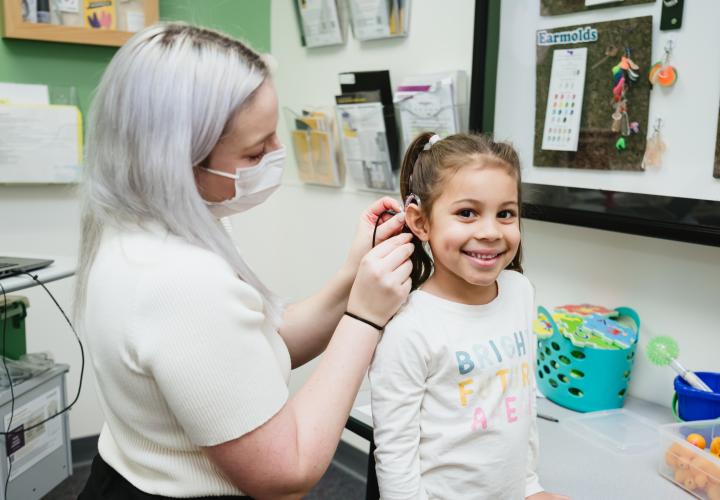1. If you suspect your child has hearing loss, do these things first.
There are different types of hearing loss disorders—some more or less severe than others. Keep the following in mind:
- Ask your pediatrician to evaluate your child for hearing loss and then request a referral to a Connecticut Children’s ear, nose and throat specialist if needed. Your child will likely have a formal hearing test by an audiologist to further define the hearing loss.
- Know that some types of hearing loss are treatable. Your ENT will evaluate your child and make recommendations about possible treatments. Depending on what is causing the hearing loss, your ENT may also recommend medications, procedures or assistive devices (e.g. hearing aids). The goal is to get kids to have as much access to sound as possible.
- Rule out infections like middle ear infection and swimmer’s ear, an outer ear infection, which can also cause hearing loss. It is important to have your child evaluated and treated. (No, swimmer’s ear is not just for swimmers.)
>Related: Beyond Hearing Loss: Annabelle’s Story
2. Stay in touch with your child’s ENT throughout the school year.
Make sure you’re both on the same page with follow-up appointments. How often, and what for? Are there specific instructions for you and your child in between appointments? For example, if your child:
- Has ear tubes, they should have a full ENT checkup, including a hearing test, every six months.
- Has a hearing device that needs updating, you may have to visit your audiologist.
3. Revisit your IEP or 504 plan, if this applies to your child.
If your child has diagnosed hearing loss and already has an IEP or 504 plan, now is the time to revisit the plan if you haven’t already. You’ll want to make sure they have the accommodations they need to be set up for success.
What does this mean?
This article from the National Education Association explains the difference between a 504 plan and an IEP plan, and the requirements to qualify.
How can I formally request a plan if I think my child needs accommodations?
There are several steps involved, but start with asking your child’s teacher to get in contact with the school’s 504 coordinator who should be able to guide you through the process.
4. Connect with your school’s resources.
Keep the lines of conversation open with school staff, teachers and coaches. Here’s how:
- Let them know about your child’s hearing loss, if you haven’t already.
- Give them a mini lesson on your child’s hearing aid, if they wear one. This includes what to do in case of a technical issue with the device.
- Work with them (and involve your child!) on any additional classroom needs and accommodations.
